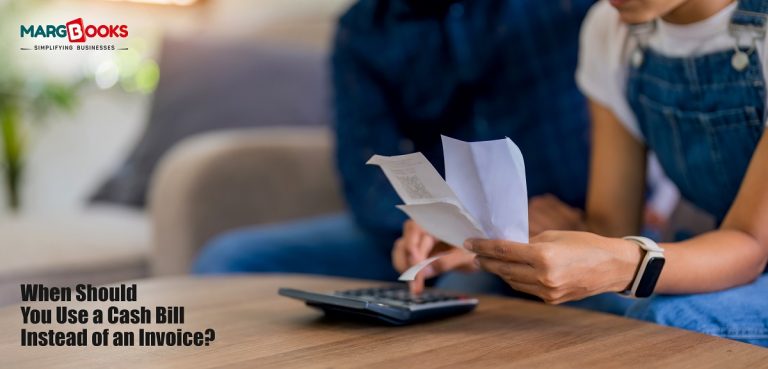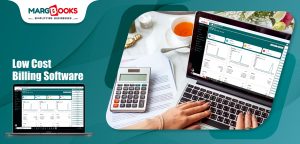In the dynamic world of Indian business, especially among retailers, wholesalers, and service providers, the debate between issuing a cash bill or an invoice often pops up. While both are valid modes of documenting a sale, choosing the right one can depend on the nature of the transaction, the buyer-seller relationship, and compliance requirements under GST.
Let’s break it down in simple terms and understand when it makes sense to opt for a cash bill rather than a formal invoice, and how tools, GST billing software, and cloud based billing software, such as MargBooks, make this process easier than ever.
Understanding the Basics: Cash Bill vs Invoice
Before we dive into the “when”, let’s clarify the “what”.
- Cash Bill: A cash bill is typically issued when the customer pays the full amount at the time of purchase with no credit involved. It’s a simpler form of transaction record, often used for quick retail sales.
- Invoice: An invoice, on the other hand, is more formal and is usually issued when payment is deferred. It may include payment terms, 15 or 30 days, and is common in B2B transactions.
When to Use a Cash Bill Instead of an Invoice?
Here are scenarios where issuing a cash bill makes more sense than raising an invoice:
1. Immediate Payment Sales
If your customer pays on the spot via cash, UPI, card, or wallet, issuing a cash bill is not only acceptable but preferred. It’s quicker and avoids the need for follow-up.
Example: A customer walks into your electronics shop and buys a mobile phone, paying immediately. A cash bill here gets the job done.
2. Retail Transactions
For most B2C (Business-to-Consumer) retail operations, especially where high volumes of low-value transactions occur, cash bills are more practical and time-saving.
3. Small Value Transactions
As per Indian GST regulations, if the value of goods or services is under ₹200 and the recipient is unregistered, there’s no compulsion to issue a full tax invoice. A cash bill works just fine.
4. Unregistered Buyers
When selling to customers who are not registered under GST (like individual buyers), especially for goods used for personal consumption, a cash bill suffices.
5. Quick Billing Requirement
In scenarios such as trade fairs, roadside stalls, or pop-up stores where there’s a need for rapid transaction processing, a cloud based billing software that can generate quick cash bills comes in handy.
How Does GST Come Into Play?
It’s a common myth that cash bills cannot include GST. They can as long as all mandatory elements, GSTIN, HSN/SAC codes, and tax breakdown are mentioned.
So, even when issuing a cash bill, businesses can remain fully GST-compliant by using a reliable GST billing software. This is where a tool, MargBooks becomes crucial.
Why Use MargBooks for Cash Billing?
MargBooks is an advanced cloud based billing software designed specifically for Indian businesses. Whether you’re a wholesaler, distributor, or retail shop owner, here’s how MargBooks makes issuing cash bills a breeze:
Real-Time Cloud Access
Work from anywhere, on any device. Perfect for businesses with multiple locations or staff.
Fast Billing Interface
Generate cash bills in seconds, ideal for rush hours and busy counters.
GST-Compliant Templates
Whether it’s a cash bill or invoice, MargBooks helps you stay compliant with auto-filled GST details.
Inventory & Accounting Integration
Every cash bill automatically updates your stock and ledger, no need for manual entry.
Easy Customer Management
Store customer details and bill history for future transactions or warranty claims.
Best Practices While Issuing a Cash Bill
To ensure your cash bills are professional and compliant, follow these tips:
- Always include date, customer name (if available), and item details.
- Mention the GST amount separately (if applicable).
- Using a consistent format, software, MargBooks can help you automate this.
- Number your cash bills systematically.
- Store digital copies for record-keeping and audit purposes.
When Not to Use a Cash Bill?
There are situations where using an invoice is mandatory or advisable:
- B2B transactions where the buyer wants to claim input tax credit.
- Credit-based transactions.
- Export transactions.
- Large orders where payment terms are agreed upon.
In such cases, always use an invoice, even if the payment is expected soon.
Final Thoughts
In the world of business, speed, accuracy, and compliance are key. A cash bill is a smart choice for immediate payments, walk-in customers, and daily retail operations. But don’t just rely on paper-based billing; choose a smart, digital-first approach with tools like MargBooks.
By using a powerful cloud based billing software that’s also GST-ready, you can handle both cash bills and invoices with ease, stay compliant, and focus more on growing your business instead of worrying about paperwork.




